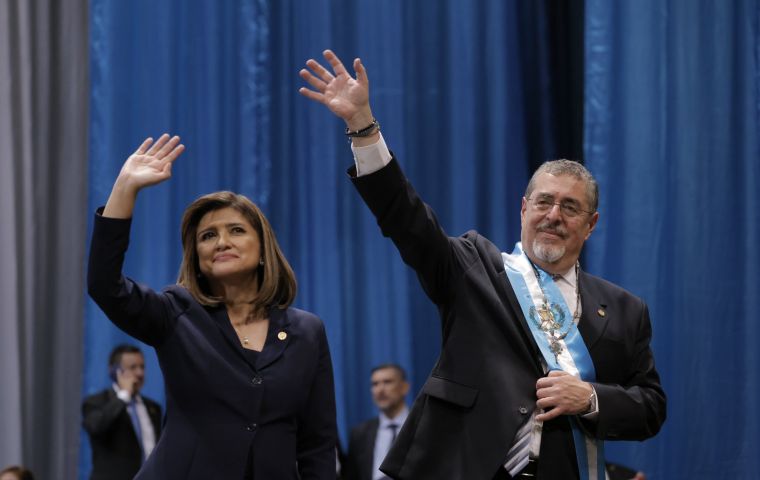MercoPress. South Atlantic News Agency
Arévalo sworn in as President of Guatemala at last
 King Felipe VI and President Boric had to leave before Arévalo was effectively sworn in due to the 10-hour delay
King Felipe VI and President Boric had to leave before Arévalo was effectively sworn in due to the 10-hour delay Although some ten hours later than scheduled, Bernardo Arévalo de León was eventually sworn in early Monday as Guatemala's new president for the period 2024-2028. After his inauguration, he was to offer his first speech as constitutional head of state. Before Arévalo's turn, 160 deputies took their oaths of office, thus extending the ceremony in time beyond projections.
Due to the delays, Spain's King Felipe VI, and Chilean President Gabriel Boric Font had to leave the country without witnessing the ceremony.
Social movements denounced that some members of the outgoing legislature tried to obstruct Arévalo's swearing-in. Also maneuvering against Arévalo were the Prosecutor's Office and some judges, it was also reported.
According to some lawmakers, the delay was intended as a “coup d'état.” On Sept. 1 last year, Arévalo accused Chief Prosecutor Consuelo Porras of wanting to prevent his inauguration.
“The people of Guatemala have demonstrated their wisdom, and institutions such as the Constitutional Court and the Supreme Electoral Tribunal have protected the sovereign desire of Guatemalans to live in democracy,” said the president in his first speech.
Arévalo received the presidential sash from the hands of Congress Speaker Samuel Pérez Álvarez, who was also appointed to his position Sunday. Outgoing President Alejandro Giammattei argued that he had to hand over his post at the latest before midnight Sunday and therefore sent the institutional symbols to Congress through his secretary.
Arévalo de Leon and Pérez Álvarez are two of the founders of the Semilla Movement, the party born of the anti-corruption demonstrations in the Central American country in 2015 leading to the fall of the government of Otto Pérez Molina, who is currently in prison.
“It is thanks to the young people of Guatemala, who did not lose hope, that today I can speak to you on this podium,” said Arévalo while thanking the indigenous peoples for defending Guatemala's democracy.
The newly inaugurated president promised in his campaign the arrival of a “new spring”, like the one that starred the government of his father, Juan José Arévalo Bermejo, between 1946 and 1951.
Since he finished second in the first round of the presidential elections and thus made it to the runoff, Arévalo and his movement were harassed by the Prosecutor's Office by magistrates of the Supreme Electoral Tribunal, in a move to reverse his victory at the polls.




Top Comments
Disclaimer & comment rulesCommenting for this story is now closed.
If you have a Facebook account, become a fan and comment on our Facebook Page!